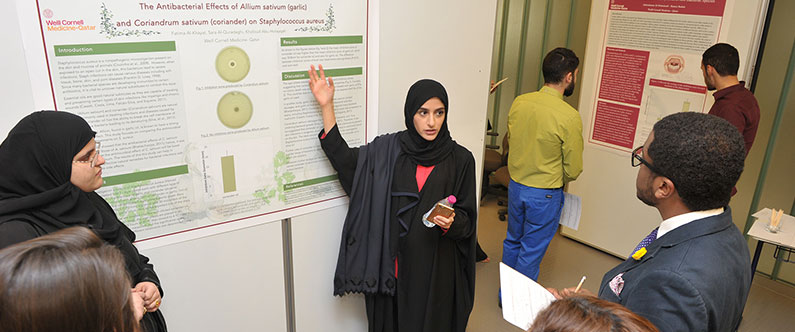Students present research projects at annual poster session
 Kholoud Abu-Holayqah discusses her research on the antibacterial effects of garlic and coriander.
Kholoud Abu-Holayqah discusses her research on the antibacterial effects of garlic and coriander.
Pre-med 1 students gained valuable experience of biomedical research when they presented the results of their biology lab projects to their peers and members of the faculty at the second annual Pre-med 1 Poster Session.
The students spent approximately a semester-and-a-half working in small groups of two and three to investigate the anti-microbial effects of various herbs and spices believed to be beneficial to health, before creating posters to present their findings at an open event.
Each group chose a number of herbs and spices and then conducted experiments to determine how far each was able to inhibit the growth of several different species of bacteria cultivated on the surface of nutrient agar in a petri dish.
The aim of the project is to provide students with the experience of conducting a real research project, beginning with the conceptualization of a research question and moving through the stages of formulating a hypothesis, designing and conducting experiments to test the hypothesis, accurately collecting and processing statistical data and then presenting the research in a public forum.
Dr. Kuei-Chiu Chen, senior lecturer in biology, said:
“This project is an important step for these students who are just beginning their careers in science. They have learned a great deal about the practical process of conducting scientific research, and they have also learned a lot about taking ownership of a project and the discipline of working independently. These are crucial attributes that the students will benefit from as they develop into professional scientists.
I am extremely impressed with the way they have risen to this challenge and the quality of the research they have presented today.”
The students presented a total of 18 posters, with projects variously investigating the antibacterial effects of coriander and garlic on the Staphylococcus aureus strain of bacteria, the effect of ginger on Corynebacteria (which can cause sore throat and diphtheria), and the antibacterial effect of thyme oil on gram-positive and gram-negative bacteria, among many other research targets.
Pre-med 1 students Ramez Bodair and Abdrahman Al-Mohamedi presented their poster on the difference between the antibacterial effect of Coffea arabica (Arabic coffee) and Amomum cardamomum (cardamom) on Corynebacteria.
Ramez said:
“We decided to test the effects of both Arabic coffee and cardamom on the Corynebacterium bacterium, because it is known to cause the respiratory disease diphtheria. Arabic coffee flavored with cardamom is very widely consumed across the Middle East and North Africa so we thought it was very relevant to our region.”
The students prepared small concentrations of Arabic coffee and cardamom in 10mm discs, which they placed into plates containing agar jelly spread with Corynebacterium bacterium. These were incubated for 24 hours before the students measured the ‘inhibition zones’ around the discs where growth of the bacteria was inhibited.
The other student groups performed similar experiments with different herbs, spices and foodstuffs, ranging from oregano to grapefruit peel to basil, and investigating their effects on different strains of bacteria.
Ramez said:
“Our results showed that the cardamom produced a larger inhibition zone than the Arabic coffee and we concluded that it therefore had a greater antibacterial effect on the Corynebacterium that causes diphtheria. This is good because it is widely available at low cost and we think further research could be conducted to see what other ways cardamom could be used to benefit the health of people across the MENA region.”
He added:
“Conducting the research project was a really enjoyable challenge and presenting it to our fellow students and the faculty taught us a lot about communication skills and the importance of ensuring all your information is 100 per cent accurate.”